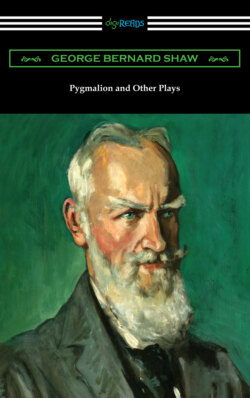Читать книгу Pygmalion and Other Plays - George Bernard Shaw - Страница 10
На сайте Литреса книга снята с продажи.
ARMS AND THE MAN ACT I
ОглавлениеNight. A lady’s bedchamber in Bulgaria, in a small town near the Dragoman Pass. It is late in November in the year 1885, and through an open window with a little balcony on the left can be seen a peak of the Balkans, wonderfully white and beautiful in the starlit snow. The interior of the room is not like anything to be seen in the east of Europe. It is half rich Bulgarian, half cheap Viennese. The counterpane and hangings of the bed, the window curtains, the little carpet, and all the ornamental textile fabrics in the room are oriental and gorgeous: the paper on the walls is occidental and paltry. Above the head of the bed, which stands against a little wall cutting off the right hand corner of the room diagonally, is a painted wooden shrine, blue and gold, with an ivory image of Christ, and a light hanging before it in a pierced metal ball suspended by three chains. On the left, further forward, is an ottoman. The washstand, against the wall on the left, consists of an enamelled iron basin with a pail beneath it in a painted metal frame, and a single towel on the rail at the side. A chair near it is Austrian bent wood, with cane seat. The dressing table, between the bed and the window, is an ordinary pine table, covered with a cloth of many colors, but with an expensive toilet mirror on it. The door is on the right; and there is a chest of drawers between the door and the bed. This chest of drawers is also covered by a variegated native cloth, and on it there is a pile of paper backed novels, a box of chocolate creams, and a miniature easel, on which is a large photograph of an extremely handsome officer, whose lofty bearing and magnetic glance can be felt even from the portrait. The room is lighted by a candle on the chest of drawers, and another on the dressing table, with a box of matches beside it.
The window is hinged doorwise and stands wide open, folding back to the left. Outside a pair of wooden shutters, opening outwards, also stand open. On the balcony, a young lady, intensely conscious of the romantic beauty of the night, and of the fact that her own youth and beauty is a part of it, is on the balcony, gazing at the snowy Balkans. She is covered by a long mantle of furs, worth, on a moderate estimate, about three times the furniture of her room.
Her reverie is interrupted by her mother, Catherine Petkoff, a woman over forty, imperiously energetic, with magnificent black hair and eyes, who might be a very splendid specimen of the wife of a mountain farmer, but is determined to be a Viennese lady, and to that end wears a fashionable tea gown on all occasions.
